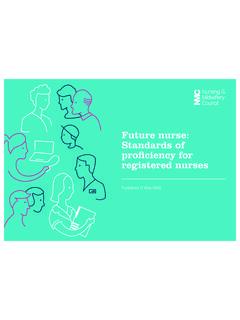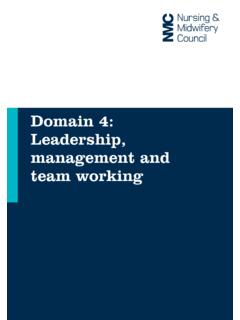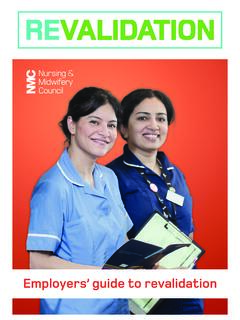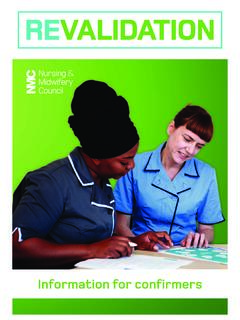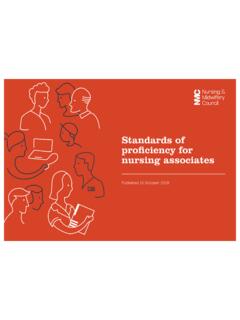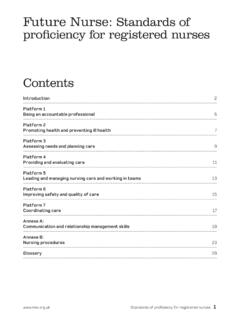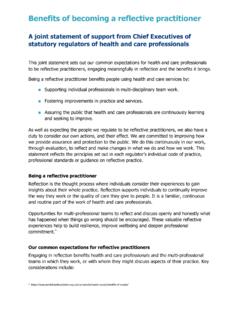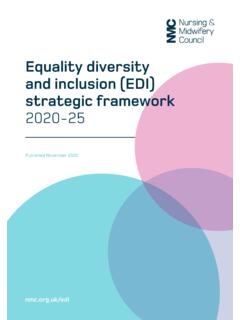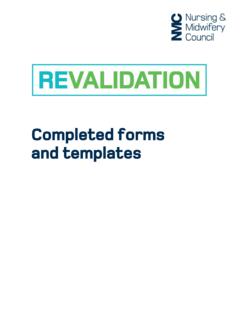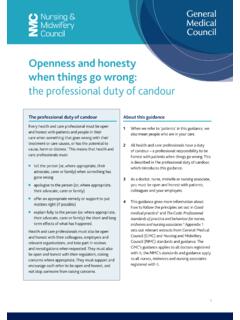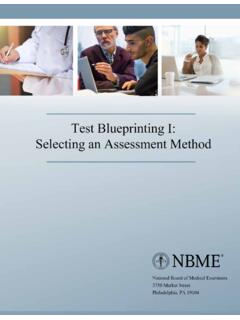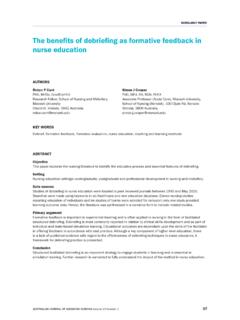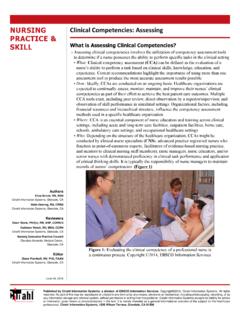Transcription of Test of Competence 2021 - adult nursing blueprint
1 The Test of Competence 2021 adult nursing blueprint Introduction We approve pre-registration nursing programmes in the United Kingdom. Applicants to the adult nursing part of our register who do not hold an NMC-approved qualification will follow an alternate route to the register. This route includes an evaluation of the qualification they hold. If their qualification is found not to be comparable to an NMC-approved qualification, the applicant will be required to complete a test of Competence , or undertake an approved compensation measure if trained in the EEA but outside the UK. This blueprint gives an overview of how each of the standards of proficiency for registered nurses and associated skills and procedures may be tested in the Test of Competence 2021 (ToC 21) How to use this blueprint The ToC 21 is made up of two parts: a multiple-choice computer based test (CBT) and a practical objective structured clinical examination (OSCE).
2 The blueprint shows how the standards of proficiency and associated skills and procedures for registered nurses may be tested in either the CBT, OSCE or both parts. Applicants can use the blueprint to prepare for each part of the test. The blueprint is mapped to the platforms in our Standards of proficiency for registered nurses (2018). The seven platforms are: 1. Being an accountable professional 2. Promoting health and preventing ill health 3. Assessing needs and planning care 4. Providing and evaluating care 5. Leading and managing nursing care and working in teams 6. Improving safety and quality of care 7. Coordinating care The communication and relationship management skills and nursing procedures identified in Annexe A and B are mapped in the blueprint to the seven platforms. Proficiencies marked with PSP are patient safety proficiencies - these must be passed in the OSCE. Platform 1: Being an accountable professional Proficiency May be tested by CBT May be tested by OSCE Understand and act in accordance with the Code.
3 Professional standards of practice and behaviour for nurses, midwives and nursing associates, and fulfil all registration requirements (PSP) Understand and apply relevant legal, regulatory and governance requirements, policies and ethical frameworks, including any mandatory reporting duties, to all areas of practice (PSP) Understand and apply the principles of courage, transparency and the professional duty of candour, recognising and reporting any situations, behaviours or errors that could result in poor care outcomes (PSP) Demonstrate an understanding of, and the ability to, challenge discriminatory behaviour Understand the demands of professional practice and demonstrate how to recognise signs of vulnerability in themselves or colleagues and the action required to minimise risks to health Understand the professional responsibility to adopt a healthy lifestyle to maintain the level of personal fitness and wellbeing required to meet people's needs for mental and physical care Demonstrate an understanding of research methods, ethics and governance in order to critically analyse, safely use, share and apply research findings to promote and inform best nursing practice Demonstrate the knowledge.
4 Skills and ability to think critically when applying evidence and drawing on experience to make evidence informed decisions in all situations Understand the need to base all decisions regarding care and interventions on people s needs and preferences, recognising and addressing any personal and external factors that may unduly influence their decisions Proficiency May be tested by CBT May be tested by OSCE Demonstrate resilience and emotional intelligence and be capable of explaining the rationale that influences their judgments and decisions in routine, complex and challenging situations Communicate effectively using a range of skills and strategies with colleagues and people at all stages of life and with a range of mental, physical, cognitive and behavioural health challenges (PSP) Annexe A 1.
5 Underpinning communication skills for assessing, planning, providing and managing best practice, evidence-based nursing care actively listen, recognise and respond to verbal and non-verbal cues use prompts and positive verbal and non-verbal reinforcement use appropriate non-verbal communication including touch, eye contact and personal space make appropriate use of open and closed questioning use caring conversation techniques check understanding and use clarification techniques be aware of own unconscious bias in communication encounters recognise the need for, and facilitate access to, translator services and material. Demonstrate the skills and abilities required to support people at all stages of life who are emotionally or physically vulnerable (PSP) Annexe A 2. Evidence-based, best practice approaches to communication for supporting people of all ages, their families and carers in preventing ill health and in managing their care share information and check understanding about the causes, implications Proficiency May be tested by CBT May be tested by OSCE and treatment of a range of common health conditions including anxiety, depression, memory loss, diabetes, dementia, respiratory disease, cardiac disease, neurological disease, cancer, skin problems, immune deficiencies, psychosis, stroke and arthritis Demonstrate the skills and abilities required to develop, manage and maintain appropriate relationships with people, their families.
6 Carers and colleagues Provide and promote non-discriminatory, person centred and sensitive care at all times, reflecting on people s values and beliefs, diverse backgrounds, cultural characteristics, language requirements, needs and preferences, taking account of any need for adjustments Annexe A 2. Evidence-based, best practice approaches to communication for supporting people of all ages, their families and carers in preventing ill health and in managing their care use clear language and appropriate, written materials, making reasonable adjustments where appropriate in order to optimise people s understanding of what has caused their health condition and the implications of their care and treatment Demonstrate the numeracy, literacy, digital and technological skills required to meet the needs of people in their care to ensure safe and effective nursing practice (PSP) Annexe A 1. Underpinning communication skills for assessing, planning, providing and managing best practice, evidence-based nursing care confidently and clearly present and share verbal and written reports with individuals Proficiency May be tested by CBT May be tested by OSCE and groups analyse and clearly record and share digital information and data provide clear verbal, digital or written information and instructions when delegating or handing over responsibility for care Demonstrate the ability to keep complete, clear, accurate and timely records (PSP) Annexe A 1.
7 Underpinning communication skills for assessing, planning, providing and managing best practice, evidence-based nursing care write accurate, clear, legible records and documentation Take responsibility for continuous self-reflection, seeking and responding to support and feedback to develop their professional knowledge and skills Demonstrate the knowledge and confidence to contribute effectively and proactively in an interdisciplinary team Act as an ambassador, upholding the reputation of their profession and promoting public confidence in nursing , health and care services Safely demonstrate evidence based practice in all skills and procedures stated in Annexes A and B. These have been mapped to the proficiencies and integrated across the platforms. See individual platforms for full details. Platform 2: Promoting health and preventing ill health Proficiency May be tested by CBT May be tested by OSCE Understand and apply the aims and principles of health promotion, protection and improvement and the prevention of ill health when engaging with people Annexe A 2.
8 Evidence-based, best practiceapproaches to communication forsupporting people of all ages, their familiesand carers in preventing ill health and inmanaging their recognise and accommodate sensory impairments during all communications support and manage the use of personal communication aids identify the need for and manage a range of alternative communication techniques use repetition and positive reinforcement strategies provide information and explanation to people, families and carers and respond to questions about their treatment and care and possible ways of preventing ill health to enhance understanding engage in difficult conversations, including breaking bad news and support people who are feeling emotionally or physically vulnerable or in distress, conveying compassion and sensitivity. Demonstrate knowledge of epidemiology, demography, genomics and the wider determinants of health, illness and wellbeing and apply this to an understanding of global patterns of health and wellbeing outcomes Proficiency May be tested by CBT May be tested by OSCE Understand the factors that may lead to inequalities in health outcomes Identify and use all appropriate opportunities, making reasonable adjustments when required, to discuss the impact of smoking, substance and alcohol use, sexual behaviours, diet and exercise on mental, physical and behavioural health and wellbeing, in the context of people s individual Promote and improve mental, physical.
9 Behavioural and other health related outcomes by understanding and explaining the principles, practice and evidence-base for health screening programmes Understand the importance of early years and childhood experiences and the possible impact on life choices, mental, physical and behavioural health and wellbeing Understand and explain the contribution of social influences, health literacy, individual circumstances, behaviours and lifestyle choices to mental, physical and behavioural health outcomes Explain and demonstrate the use of up to date approaches to behaviour change to enable people to use their strengths and expertise and make informed choices when managing their own health and making lifestyle adjustments Annexe A 2. Evidence-based, best practiceapproaches to communication forsupporting people of all ages, their familiesand carers in preventing ill health and inmanaging their assess motivation and capacity for behaviour change and clearly explain cause and effect relationships related to common health risk behaviours including Proficiency May be tested by CBT May be tested by OSCE smoking, obesity, sexual practice, alcohol and substance use Use appropriate communication skills and strength based approaches to support and enable people to make informed choices about their care to manage health challenges in order to have satisfying and fulfilling lives within the limitations caused by reduced capability.
10 Ill health and disability Provide information in accessible ways to help people understand and make decisions about their health, life choices, illness and care Promote health and prevent ill health by understanding and explaining to people the principles of pathogenesis, immunology and the evidence-base for immunisation, vaccination and herd immunity Protect health through understanding and applying the principles of infection prevention and control, including communicable disease surveillance and antimicrobial stewardship and resistance (PSP) Annexe B 4. Use evidence-based, best practice approaches for meeting the needs for care and support with hygiene and the maintenance of skin integrity, accurately assessing the person s capacity for independence and self-care and initiating appropriate interventions use aseptic techniques when undertaking wound care including dressings, pressure bandaging, suture removal and vacuum closures use aseptic techniques when managing wound and drainage processes Note: In addressing the above the candidate must ensure they are ready to Proficiency May be tested by CBT May be tested by OSCE demonstrate procedures at an appropriate level for the adult field of nursing practice when undertaking procedures for assessing needs for person centred care.
